|
|
|
Sort Order |
|
|
|
Items / Page
|
|
|
|
|
|
|
| Srl | Item |
| 1 |
ID:
171356
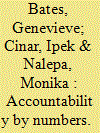

|
|
|
|
|
| Summary/Abstract |
In an era of democratic backsliding, scholars and policymakers wonder if failure to reckon with former authoritarian elites and their collaborators plays a role. Yet without adequate data on the way former autocracies and countries emerging from conflict deal with human rights violators, it is hard to tell if new democracies are unstable because of their failure to reckon with their former authoritarian elites or despite it. We introduce a dataset of personnel transitional justice events that allows scholars to answer such questions, disaggregating these events temporally from the date of a country’s democratization. The time series nature of our data allows scholars to measure key characteristics of states’ dealing with their past and complements existing transitional justice datasets by focusing not only on post-conflict societies and not only on post-authoritarian societies, but on both. To showcase the possibilities our data affords scholars, we use it to develop three novel measures of personnel transitional justice: severity, urgency, and volatility. The granular structure of our data allows researchers to construct additional measures depending on their theoretical questions of interest. We illustrate the use of severity of transitional justice in a regression that also employs data from the Varieties of Democracy project.
|
|
|
|
|
|
|
|
|
|
|
|
|
|
|
|
| 2 |
ID:
183751
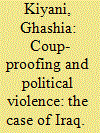

|
|
|
|
|
| Summary/Abstract |
This article examines the impact of coup-proofing on political violence while a leader is in power and during regime transition. This study focuses on the case of Iraq during Saddam Hussein’s rule between 1979-2003 and including the aftermath of the 2003 US invasion, which led to Saddam’s removal from power. The article argues that Saddam Hussein’s coup-proofing strategies allowed him to implement political violence and human rights abuses against the wider population. Moreover, Saddam’s coup-proofing strategies exacerbated violence beyond his rule by driving his former regime loyalists into violent insurgencies as well as indirectly by setting up a society with large amounts of distrust between loyalists and others.
|
|
|
|
|
|
|
|
|
|
|
|
|
|
|
|
| 3 |
ID:
146161
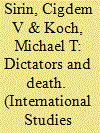

|
|
|
|
|
| Summary/Abstract |
Why are some authoritarian regimes so quick to surrender amid lower numbers of casualties while others prove willing to incur significant casualty counts to continue their war efforts? In this study, we explore the propensity of different authoritarian regime types to sustain casualties in interstate conflicts. We argue that authoritarian leaders with smaller winning coalitions find it easier to distribute the costs of militarized conflicts outside of those coalitions. This diminishes their sensitivity to casualties. Applying a theoretical model based on an inverse divide-the-dollar game (with respect to the distribution of public “bads”), we find that personalist regimes tend to sustain the highest number of casualties in militarized interstate disputes when compared to other autocracies. Our findings suggest that along with the audience cost abilities of an autocratic adversary, target states should also consider an autocratic regime's casualty sensitivity in deciding whether to reciprocate with military action.
|
|
|
|
|
|
|
|
|
|
|
|
|
|
|
|
| 4 |
ID:
110544
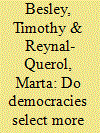

|
|
|
|
|
| Publication |
2011.
|
| Summary/Abstract |
This paper uses a unique data set on over 1,400 world leaders between 1848 and 2004 to investigate differences in educational qualifications between leaders who are selected in democracies and autocracies. After including country and year fixed effects, we find that democracies are around 20% more likely to select highly educated leaders. This finding is robust to a wide range of specifications, choices of subsamples, controls, and ways of measuring education and democracy.
|
|
|
|
|
|
|
|
|
|
|
|
|
|
|
|
| 5 |
ID:
152100
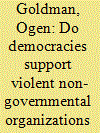

|
|
|
|
|
| Summary/Abstract |
This study draws attention to the question: Do democracies fight indirectly through material support to violent non-governmental organizations (VNGOs) which wage intrastate war against other states in general and against democracies in particular, or are democracies less warlike by proxy? The main conclusions are: democracies are less warlike by proxy than non-democratic states, and the more democratic the regime the lower the probability that it will support VNGOs waging war against other states, both in general and against other democracies in particular. The results do not unequivocally support both the monadic or dyadic argument of democratic peaceful behaviour
|
|
|
|
|
|
|
|
|
|
|
|
|
|
|
|
| 6 |
ID:
141454
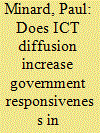

|
|
|
|
|
| Summary/Abstract |
Numerous scholars have suggested that ICT diffusion may lead to more responsive governance in China. To date, however, few empirical studies have been made of the political implications of China's Internet, and previous studies of the association between citizen access to information and government responsiveness have focused on democratic contexts, relying on electoral mechanisms as explanations for the observed positive relationship. This article investigates ICT diffusion and government responsiveness in China by examining data on the composition of government spending. Results indicate that increasing ICT diffusion is associated with a higher proportion of provincial government spending devoted to health and education, and a lower proportion devoted to capital construction. A collective action mechanism is proposed as a potential driver of these results.
|
|
|
|
|
|
|
|
|
|
|
|
|
|
|
|
| 7 |
ID:
138834
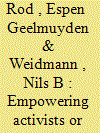

|
|
|
|
|
| Summary/Abstract |
The reported role of social media in recent popular uprisings against Arab autocrats has fueled the notion of ‘liberation technology’, namely that information and communication technology (ICT) facilitates organization of antigovernment movements in autocracies. Less optimistic observers, on the other hand, contend that ICT is a tool of repression in the hands of autocrats, imposing further restrictions on political and social liberties. We investigate whether the liberation- or the repression-technology perspective can better explain empirically observed patterns. To this end, we analyze two outcomes. First, we look at which autocracies are more likely to adopt and expand the Internet. In line with the repression technology expectation, we find that regimes aiming to prevent any independent public sphere are more likely to introduce the Internet. Second, we study the effects of the Internet on changes towards democracy. This analysis reveals no effect of the Internet on political institutions. These findings provide moderate support for the ‘repression technology’ perspective, and suggest that the Internet has not – at least in its first two decades of existence – contributed to a global shift towards democracy.
|
|
|
|
|
|
|
|
|
|
|
|
|
|
|
|
| 8 |
ID:
134151


|
|
|
|
|
| Publication |
2014.
|
| Summary/Abstract |
Allowing or restricting foreign movement is a crucial policy choice for leaders. We argue that freedom of foreign movement reduces the level of civil unrest under non-democratic regimes, but only in some circumstances. Our argument relies on the trade-offs inherent in exit and voice as distinct strategies for dealing with a corrupt and oppressive state. By permitting exit and thereby lowering its relative costs, authoritarians can make protest and other modes of expressing dissatisfaction less attractive for potential troublemakers. Liberalizing foreign movement can thus function as a safety valve for releasing domestic pressure. But the degree to which allowing emigration is an effective regime strategy is shaped by the economic opportunities offered by countries receiving immigrants. We find that freedom of foreign movement and the existence of economic opportunities abroad reduce civil unrest in non-democratic states. However, at high levels of unemployment in the developed world, greater freedom of foreign movement actually increases protest.
|
|
|
|
|
|
|
|
|
|
|
|
|
|
|
|
| 9 |
ID:
138306


|
|
|
|
|
| Summary/Abstract |
How and why do regime type and interstate war affect government spending? We argue that a political leader allocates scarce resources between social and military expenditures as a function of their relative efficiency in securing her political survival. We derive four hypotheses concerning how mobilization for and demobilization from interstate war affects government spending differently in democratic and autocratic regimes. Compared to democracies, autocracies should increase military spending to a greater degree during wartime and decrease military spending to a greater extent following a war. Autocracies also should cut social spending more during an interstate war and increase social spending more during the process of demobilization from war than democracies. Our analyses of all states in the international system from 1950 to 2001 yield support for our hypotheses.
|
|
|
|
|
|
|
|
|
|
|
|
|
|
|
|
| 10 |
ID:
124986
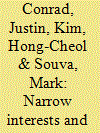

|
|
|
|
|
| Publication |
2013.
|
| Summary/Abstract |
Narrow interests and military resource allocation in autocratic regimes
Why do some autocratic states allocate more resources to the military than others? We contend that as narrow political interests have more influence on a leader, relative to broader political interests, a state's military burden increases. Further, we argue that two domestic factors are central to explaining the relative strength of narrow political interests for military spending, and therefore variation in state military burden. First, institutions that increase the cost of political participation reduce the influence of the median citizen, increasing the strength of narrow political interests and, concomitantly, military spending. Second, as a regime ages, narrow interests become more entrenched and the regime becomes less concerned about overthrow. In turn, older regimes spend more on their militaries. We test hypotheses from this argument by examining the military burden for all autocracies over the period 1950-2000. We find that variation in restrictions on political participation and the age of the regime are central to understanding differences in military spending among autocracies. Further, once these institutional features are taken into account, we find only modest support for the view that certain types of regimes spend more than others. What matters is not regime type but specific institutional features that affect the strength of narrow interests and vary across, and within, autocratic regimes.
|
|
|
|
|
|
|
|
|
|
|
|
|
|
|
|
| 11 |
ID:
103390
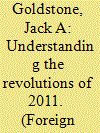

|
|
|
|
|
| Publication |
2011.
|
| Summary/Abstract |
Revolutions rarely succeed, writes one of the world's leading experts on the subject -- except for revolutions against corrupt and personalist "sultanistic" regimes. This helps explain why Tunisia's Ben Ali and Egypt's Mubarak fell -- and also why some other governments in the region will prove more resilient.
|
|
|
|
|
|
|
|
|
|
|
|
|
|
|
|
|
|
|
|
|